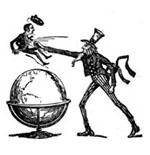
Is the Natural Law Still Natural?
PERMANENCE IN AN ERA OF CHANGE
Ed. Note: The following article was written partly in response to Melinda Selmys’s June article, “Is the ‘Natural Law’ Concept Obsolete?” in which she argues that “natural-law theory as it appears in the modern political sphere…is eminently convincing to those who already believe in Christian virtue, but is alien and irrelevant to everyone else.” She maintains that “Christians must find a way to appeal to the truths about the human person” that makes sense to postmodern man. Mrs. Selmys’s reply to Dr. DeMarco follows.
Natural Law…is the sole source of all value judgments. If it is rejected, all value is rejected…. There has never been, and never will be, a radically new judgment of value in the history of the world…. The human mind has no more power of inventing a new value than of imagining a new primary color. — C.S. Lewis
The host of a highly respected primetime Canadian TV show recently interviewed a Catholic priest on the subject of the natural law. He seemed bemused by the priest’s acceptance of this presumably outmoded notion. “It’s now 2012,” the host reminded his guest, “with all the new technology we have, don’t you think that nature isn’t as natural as it used to be?”
As I watched the telecast, it struck me how effective the medium of television can be in making myths more convincing than facts, and fallacies more compelling than logic. Television, after all, is more an entertainment medium than an educational one. Sheer entertainment, more often than not, is momentary.
The calendar is not a reliable basis for determining morality. Aristotle and subsequent logicians found the argumentum ad annum (“argument from the year”) to be clearly fallacious. Neither the year 2012 nor any other year implies any status or change in morality, or in understanding morality as living by the principles based on the natural law that lead to true human flourishing. Morality and chronology do not intersect.
The “myth of progress” does not apply to the steadiness of the natural law. In an era of massive change, it is difficult for many people to believe that anything can stay the same. This popular myth is misapplied to all of society and change is believed to happen automatically. The natural law, which does not change, provides the opportunity for an individual person to change, not automatically but through reason and freedom. And this change is both real and personally beneficial.
You May Also Enjoy
The pew Catholic, however ignorant he may be of church architecture, has his Catholic intuition and common sense. If he says it looks ugly, it’s because it is ugly.
We do not trust in princes -- even sometimes the princes of the Church -- but in the solemn promises of Jesus Christ.
Enforced silence is not the same as acceptance. Silence often breeds contempt; contempt, then, breeds anger; and anger can breed violence.

